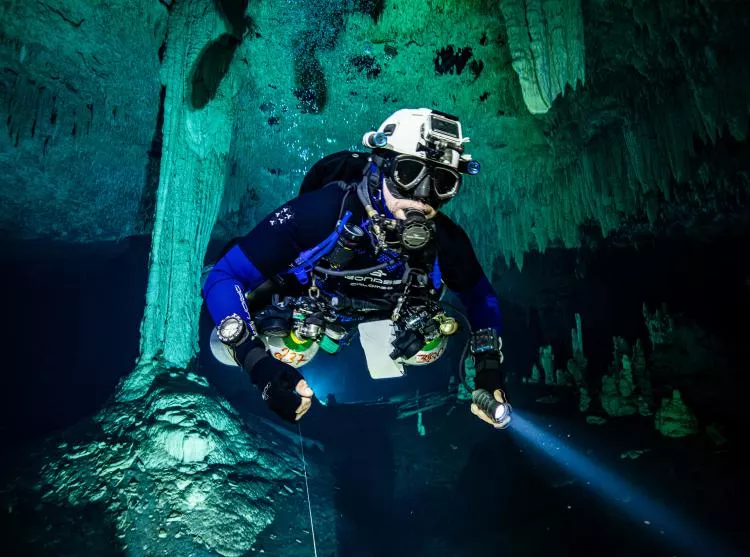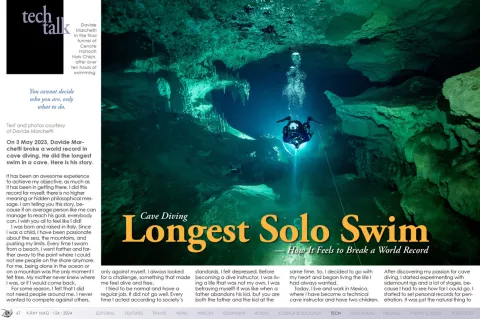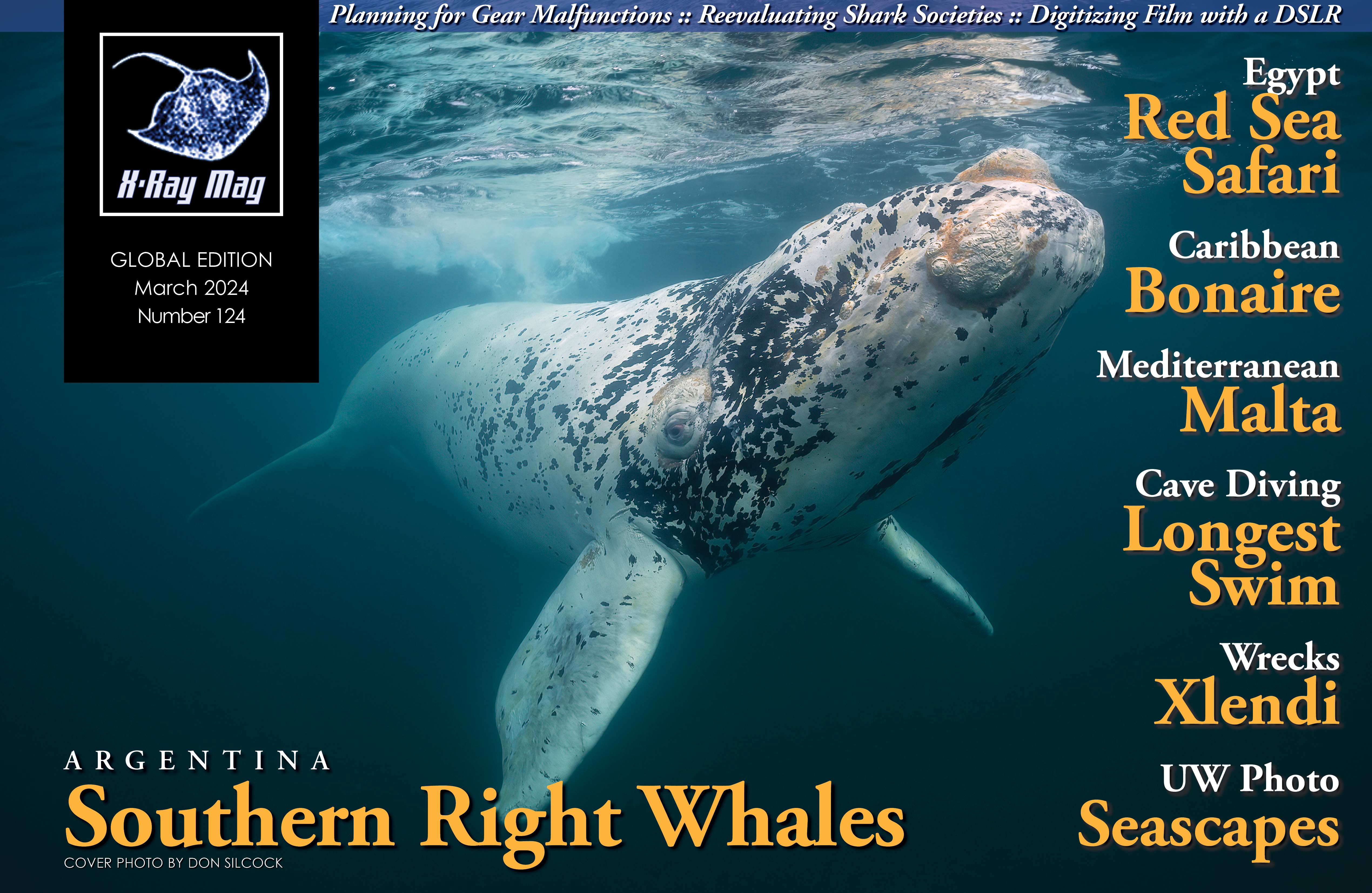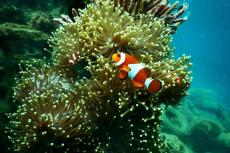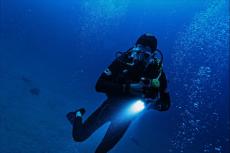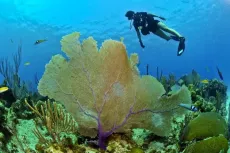On 3 May 2023, Davide Marchetti broke a world record in cave diving. He did the longest swim in a cave. Here is his story.
Contributed by
It has been an awesome experience to achieve my objective, as much as it has been in getting there. I did this record for myself; there is no higher meaning or hidden philosophical message. I am telling you this story, because if an average person like me can manage to reach his goal, everybody can. I wish you all to feel like I did!
I was born and raised in Italy. Since I was a child, I have been passionate about the sea, the mountains, and pushing my limits. Every time I swam from a beach, I went farther and farther away to the point where I could not see people on the shore anymore. For me, being alone in the ocean or on a mountain was the only moment I felt free. My mother never knew where I was, or if I would come back.
For some reason, I felt that I did not need people around me. I never wanted to compete against others, only against myself. I always looked for a challenge, something that made me feel alive and free.
I tried to be normal and have a regular job. It did not go well. Every time I acted according to society’s standards, I felt depressed. Before becoming a dive instructor, I was living a life that was not my own. I was betraying myself! It was like when a father abandons his kid, but you are both the father and the kid at the same time. So, I decided to go with my heart and began living the life I had always wanted.
Today, I live and work in Mexico, where I have become a technical cave instructor and have two children. After discovering my passion for cave diving, I started experimenting with sidemount rigs and a lot of stages, because I had to see how far I could go. I started to set personal records for penetration. It was just the natural thing to do, like when I was swimming from the beach as a kid.
I always had this urge to reach the top or the bottom or get to the end of something. Once you get to the bottom of the sea and look up, or on top of a mountain and look down, you see your past, present and future, all at once. You realise what you are capable of, and that now you better find some courage for what comes next. You will find yourself.
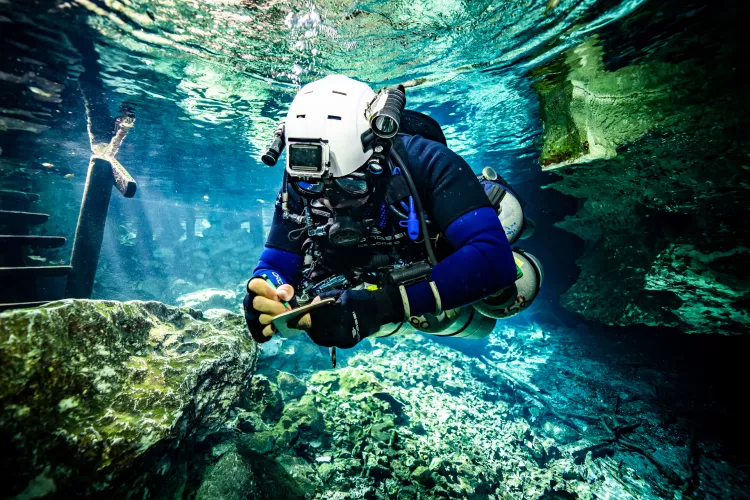
Inspiration
Seven years ago, I came across some data on world records in diving, and I was fascinated by the maximum penetration performed by Sheck Exley in Florida. I started reading up about him, and I learnt how he dedicated his life to becoming a better diver and helping others do the same. I was inspired by his story.
Two years ago, I realised that if I kept pushing my distance record, I would have broken Exley’s record. I had to do it. I had no choice! It was the natural evolution of my diving career. I had never tried to be better than him, I just wanted to be better than myself.
His dive was very different from mine. He broke a record while exploring a deep cave with high flow. I was going to plan my dive with the sole purpose of going as far as possible, in the most efficient way possible.
Thanks to him, I finally found my inner challenge. At the same time, I had the opportunity to show my children that we can achieve whatever we want, if we accept who we are, work hard and be smart. I knew that I was going to spend time away from them, because of my training. One must become excellent at making compromises.
I was going to break the record for the longest solo swim in a cave. I liked that idea, and I knew how to do it… At least, that was what I thought.
If you decide to do something, do it properly
I set a date and had two years to get ready. Everything got real, really fast. Now was the moment to plan it all in my mind.
My objectives were to see how many tanks I could carry, find the perfect cave, and make a plan. I soon realised that six tanks were my limit, and if I wanted to use more, I had to place them along the cave line in advance. I knew I wanted to dive with a wetsuit, within no-deco limits and with nine tanks in total, for a penetration between four and five kilometres. I also wanted to start upstream so I could come back with the current.
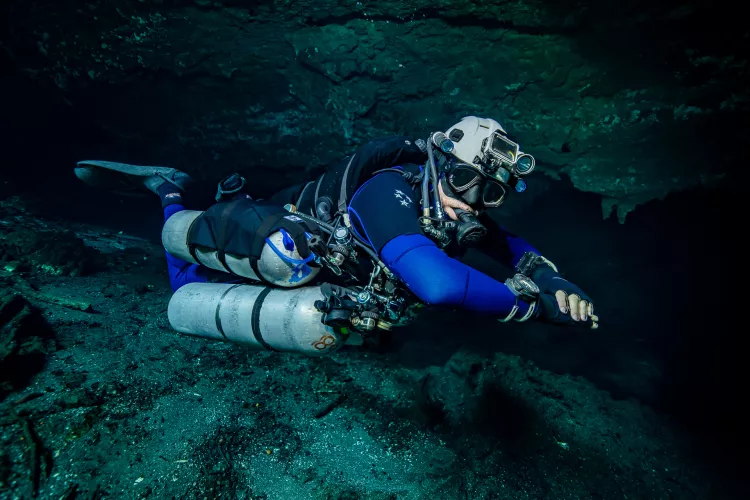
Training dives
I decided to do my record in Nohoch Nah Chich, a cave system connected to Sac Actun, one of the longest cave systems in the world, here in Mexico. With six metres of depth, beautiful formations, wide passages, restrictions, interesting navigation and a nice current, it was the perfect place.
When diving for more than six or seven hours, gas is not the only limit. I was going to need a decent light, CamelBaks for hydration, a catheter for my freediving suit, and a sidemount rig capable of keeping me horizontal with two to six tanks, full or empty.
I was so focused on equipment and navigation, that I forgot the most important factor… me! I thought that going from my usual six-hour dives to eight- or nine-hour dives would have been easier than it was. But when swimming for so long, even if you are fit, just one fin kick too hard can cause a cramp. Breathing inefficiently for just a few minutes can cause CO2 retention, headaches and trigger stress. Being excessively tired can cause a loss of focus, leading to navigation errors. So, I would constantly be on the verge of failure. It would feel as if I was fighting the final boss in a video game, with my health bar at the minimum the whole time.
During training, I was experiencing some problems with my sidemount configuration. My lower back hurt like hell. My neck was compressed by the weight of the stages on my D-rings, and I was getting dizzy. I had cramps in my calves, tibialis, hamstrings, pectorals and abdominals. My body was giving up. I had to make drastic changes to my harness and workout routine. I had to keep experimenting and failing until I found a solution.
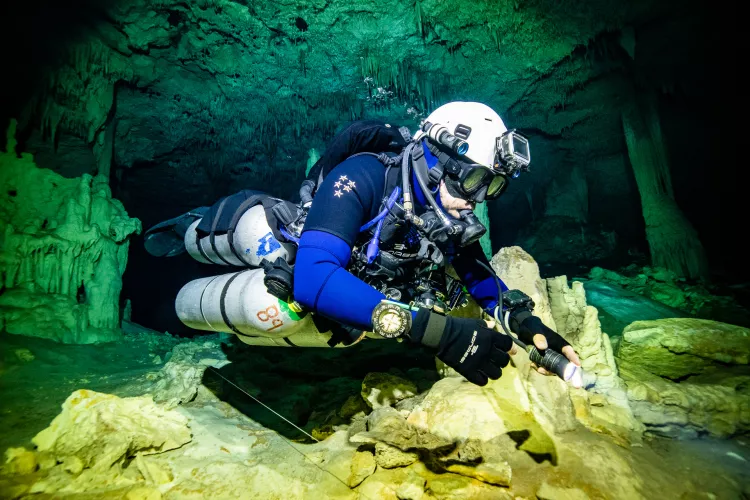
Feedback and support
The psychological stressors I was exposed to were not only due to my physical challenges, but also to the negative feedback I received from other dive professionals, acquaintances and social media trolls. I was genuinely surprised by some of the negative comments I got. I was told, both to my face and online, that what I was doing was stupid, pointless, risky or just wrong. I was told to find another job, to go back to my country, to learn how to take care of my family, and to learn how to dive.
On the other hand, the support I got from my family and colleagues was one of the best things that I had ever experienced in my life. They joined my training dives, shared their knowledge, and brought constructive criticism to the table. I decided to focus on that, instead of the negative comments.
I understand now how people do not want to take the risk to do what they really want to do, because they do not want to be harassed by society. But at this point, I was committed to my goals more than ever, because if I let these negative influences affect me, how could I help my kids overcome the same issues in the future?
Finding solutions
So, I studied human anatomy to figure out some more ergonomic solutions for my harness. I was very excited because every error was getting me closer to finding a solution. I hired a personal trainer, who helped me develop the muscles I needed to be stronger and endure fatigue. Every set and repetition I did was, in my mind, one more fin kick, or one more minute I could swim.
Workouts make your body and mind stronger. Thinking about an entire training session can be overwhelming, but if you focus on just one repetition at a time, you realise that you are capable of much more than you thought.
After two years and many trials, all my equipment was ready. My sidemount configuration was beautiful, and it still is. I knew that it was not perfect, but it worked very well. Perfection is relative to your ego; efficiency is relative to your objectives. My body was better now in my 40s than it had ever been before (which is a total lie, but let’s all pretend that it’s true).
I told myself: “I build my equipment and my body all by myself, without any help, because I am perfect!”
If that were the truth, I would be an extremely sad and delusional individual.
I still love to be alone, and I have very few friends. But to achieve my goals, I had to let go of my ego, learn how to ask for help, and recognise my limitations. If it was not for my family, friends, colleagues and other professionals, I would not have made it. All the love, support and respect that I received made this a great experience. When people decide to dedicate their time to you, it means something!
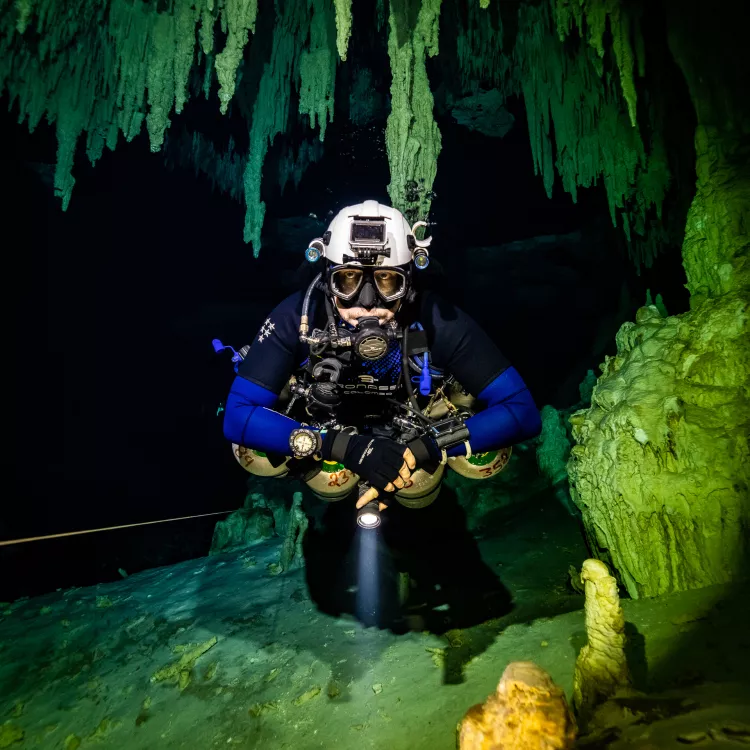
Time to find courage
It was the day of the record attempt. My support divers and I were getting ready. It was all happening right now.
Since my childhood, I had seen family members dying in the hospital. I remembered how the surgeons were cold and focused when they told you all the horrible things that could go wrong if they could not fix them. They looked like robots when they worked, but they cried like us when they lost a patient. When operating, surgeons have to stop being human and suffer in silence, so you can live.
When a human being has to focus on an extremely difficult task, he or she has to disconnect from the emotional consequences of the outcome. I love doctors because they never give up trying. I learnt from them to disconnect from my heart, operate with my brain, and take risks, because once you are in it, what other choice do you have?
When I am diving, I have no name, no family, no friends, no past, no future, no desires. I just have a task, then the next task, until the mission is completed. I enjoy this mental sharpness, as much as I enjoy the environment and the aquatic life. I enjoy every fin kick, every negotiation of a restriction, every gas switch.
When it is time to do something complex, where the risk factor can trigger too many emotions, I need my sharpness. If we let fear and other negative emotions affect our judgment, we will mentally leave the dive and regret the decisions that led us there. One must stay in the dive, working on the solution, instead of rejecting the problem.
Challenges on the dive
I knew that on a ten-hour dive, I was going to have some inconveniences; it was inevitable. I had some minor equipment malfunctions and committed some avoidable errors because I was human. Acceptance is the first step in solving problems.
I had a delay during my dive because I made a last-minute change. I tried to pass through a restriction with too many tanks rather than dropping one on the line before the tight passage. Now, I was stuck, head down, holding three tanks with one hand, like an idiot. It was my own fault. Last-minute changes are the worst things to do. We can make mistakes when we change our routine, or when we do something new.
While I was backing off, to leave the tank before the restriction as planned, I told myself a lot of essential things in a fraction of a second:
“I expect and accept problems as part of the dive. I accept that I made a mistake. I accept the negative emotions about my stupidity. I am a normal person and stress is a normal reaction.”
“I am the person I want to be. I am where I want to be. I am doing what I want to do. I put myself in this situation.”
And the last thing was: “What is done, is done. Move on now!”
In about twenty minutes, I managed to fix the problem that I had created for myself. I was late, but I was back on track!
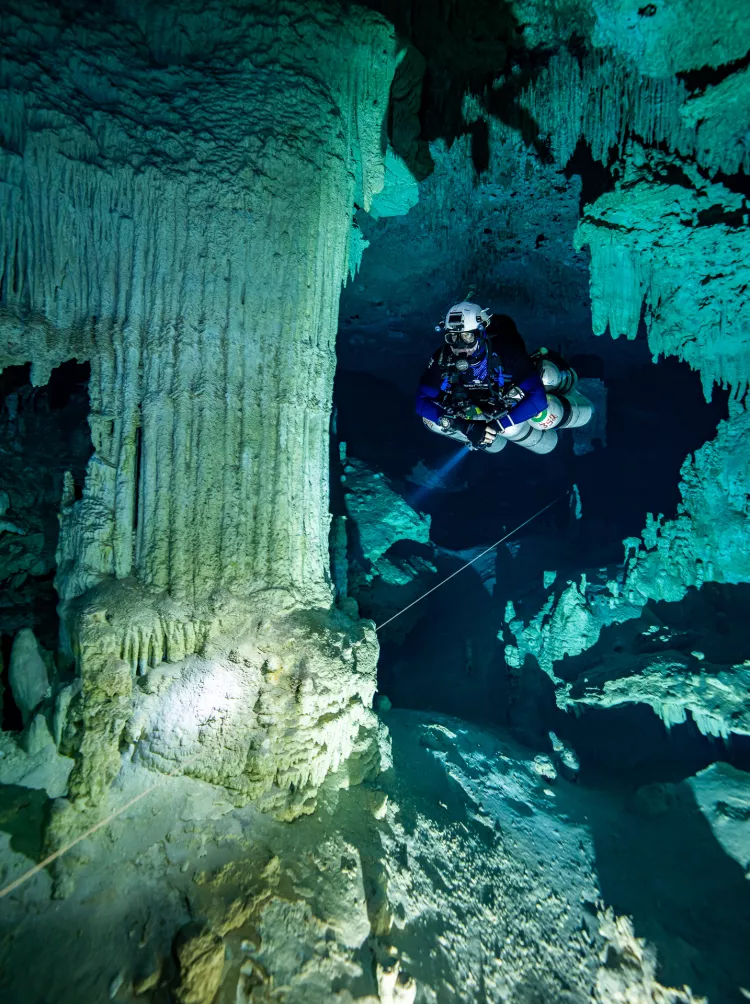
Early experiences
I was not always like this. When I was nine, my father left me alone on a mountain. At first, I cried for what felt like an eternity, waiting for him to come back. I had to become hard, unfeeling, and focus on finding my way back before nightfall. I grew up, repressing my feelings as a survival mechanism. After that day, I started swimming and hiking by myself.
As I grew up, I knew I had to change this unrewarding behaviour. Later, educating my students and my children helped me find a way to accept their emotions and mine. Learning empathy helped me to become better at handling stress.
It feels great to experience a high level of focus, without having to repress emotions. One has to accept emotions and let them run in the background. That’s it.
Back to the record attempt
After more than ten hours and eight kilometres, I completed the dive. I made it! Seeing my friends cheering for my achievement was the best thing ever. Indeed, it was our achievement, and sharing it with them made it even bigger!
A life-changing experience
This experience has had two positive outcomes in my life. First, I finally have the lifestyle I had always wanted. I eat, drink, sleep, train and study to become a better diver. I feel healthier and wiser, and my kids can learn about this from me.
Second, my students can benefit from all the experiments I did on my equipment and myself. They do not have to do all that I do, but I can apply most of my knowledge to the sidemount and cave diving courses I teach. The balance between ergonomics and hydrodynamics in the equipment configuration, the body posture, and the propulsion techniques are all topics that I can share with them.
I am grateful for letting people into my life, and for all the positive and negative experiences I had. I believe we have to decide with the heart, plan with the brain, and act with courage. ■

